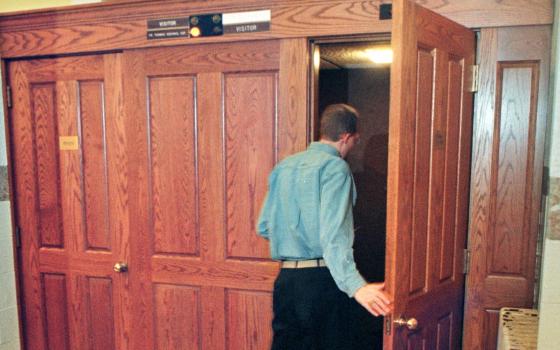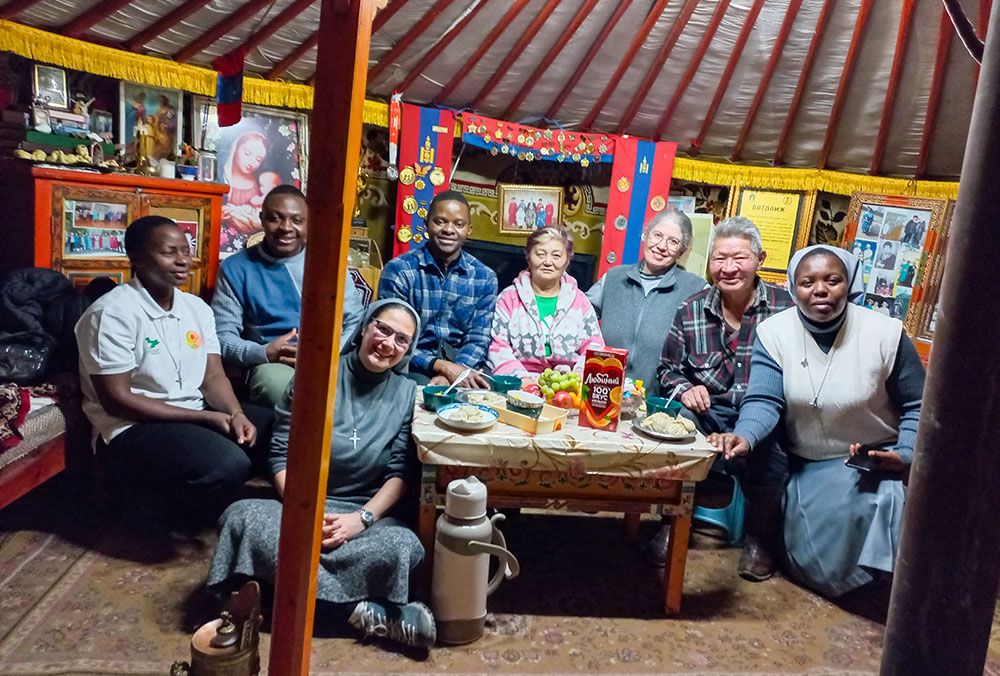
Consolata Missionary Sisters and Fathers visit a family in Arvaikheer, Mongolia. (Courtesy of Francesca Allasia)
Every missionary destination is a gift, and I was given the gift of Mongolia: a faraway country, not only geographically speaking but also in terms of climate, culture, language and way of life, all vastly different from what I knew.
Our presence there began almost 22 years ago. In July 2003, the first group of Consolata Missionaries (fathers and sisters) arrived in Mongolia. Four principles guided the two institutes in their decision to open a mission in this land of blue skies:
- Spreading the Gospel among non-Christians;
- Engaging in dialogue with major religions;
- Being a presence of consolation among impoverished populations;
- Bearing witnesses to unity around a shared pastoral project.
To understand the context in which our mission unfolds, one must first understand Mongolia today. About half of Mongolia's population resides in the capital, Ulaanbaatar, while the rest live in the vast steppes or small towns. About 30% still lead nomadic lives. Over the past 30 years, Mongolia has undergone a rapid transformation that includes changing living conditions, a fair amount of economic development, and a rapid process of technologization.
Advertisement
These developments have contributed to a more complex society and, to some extent, an even more jarring difference between the nomadic and urban lifestyles, as globalized trends continue to influence local traditions.
Religion in this country reflects this complexity. In a country with a Buddhist majority and a strong shamanic heritage, the Catholic community has about 1,500 baptized people. Together with Christians of other denominations, they make up less than 2% of the entire population, while about 40% have no religious affiliation.
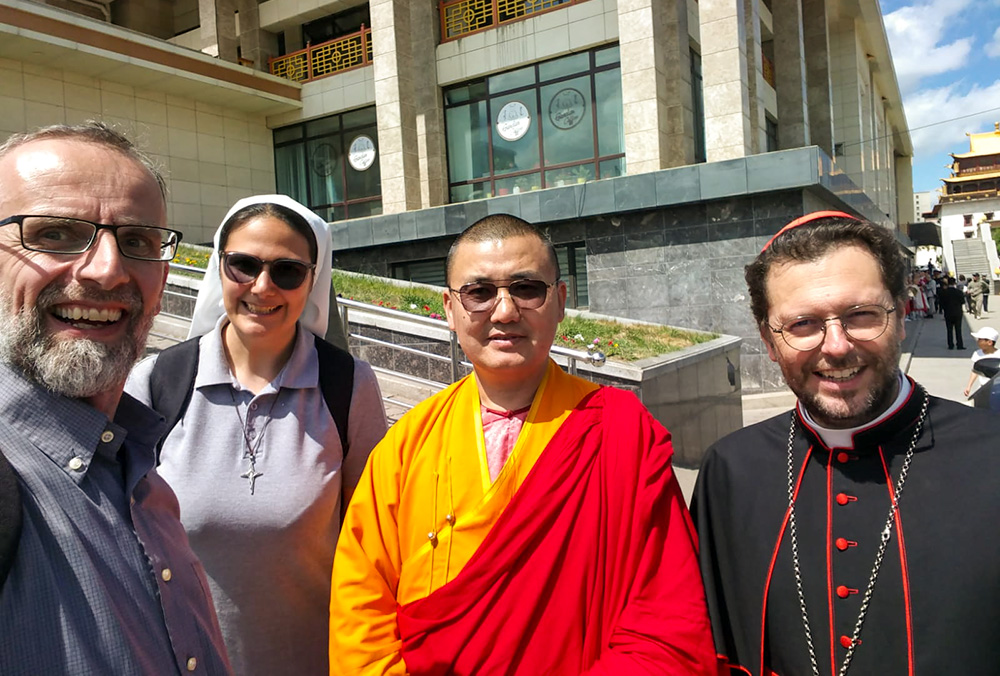
From left: Fr. Daniele Giolitti and Sr. Francesca Allasia, both Consolata Missionaries; a Buddhist monk of Gandan Monastery; and Cardinal Giorgio Marengo, during an interreligious dialogue event on Vesak Day at the monastery (Courtesy of Francesca Allasia)
In this context, the commitment of the church — which has a local priest and more than 60 missionaries and missionaries from different countries around the world — is to offer paths of faith where lived life can be fertilized by the Gospel.
Over all these years, one thing has become increasingly clear: the mission is God's. It is he who opens hearts and prepares paths, and we must trust and rely on him. We live a mission in which the contemplative dimension and human promotion are fundamental; in which each missionary has a profound experience of permanent conversion, humility, honesty, purification and impermanence that indelibly marks her heart. Our relationships with people, characterized by friendship, are a simple and sacred space for an exchange of life at the heart of our mission.
Of course, this mission is not without its challenges. It requires long periods of insertion, the study of the local language — learning how to read and write in the Cyrillic alphabet! — facing the winter that lasts six months and the cold that plummets to -40 or -45 degrees Celsius.
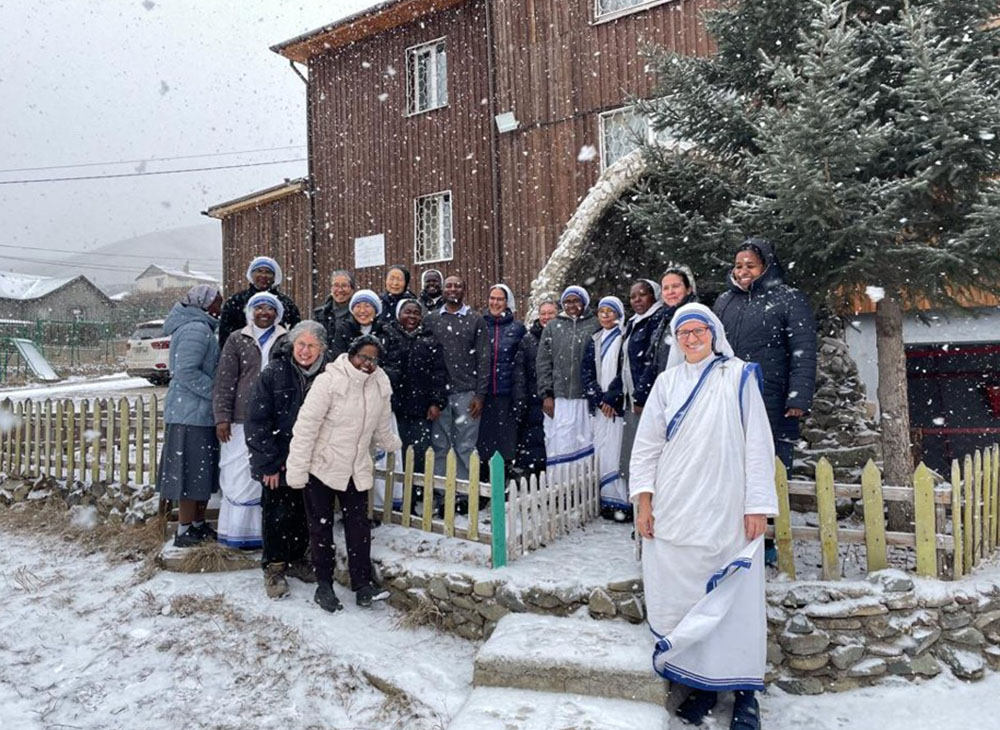
A group of women religious gather in Ulaanbaatar, Mongolia. (Courtesy of Francesca Allasia)
Step by step and with love, we engage with the Mongolian culture, embracing the infinite richness of values, and the profound human and spiritual sensitivity, of the people we serve. The Mongolian people themselves guide us in these steps. The Mongolian people, with a long nomadic tradition, are strong, generous, courageous people. They are great observers; they can grasp whether you sincerely love them or not. For them, gestures are filled with meaning and a certain rituality.
Life in the midst of the Mongolian people is teaching me the value of littleness that is lived in the everyday — the true place of mission. Being small is not so easy. It requires a good deal of patience, trust, energy, humility and simplicity. It takes curious eyes, attentive ears, an open heart willing to be transformed, and above all else a deep love.
And so begins that blessed upheaval that happens in the missionary's heart if we allow ourselves to be touched by our new reality: the feeling of being upside down, of having to start all over again. At the same time, there is a deep sense of home, a feeling of belonging to the people with whom one is walking, which is born and grows in the heart.
Here, one discovers that one is a pilgrim, a "nomad of God," leaving behind what is known in order to welcome, as a gift, the newness that the mission offers. It means crossing the geographical deserts, but also the deserts of life.
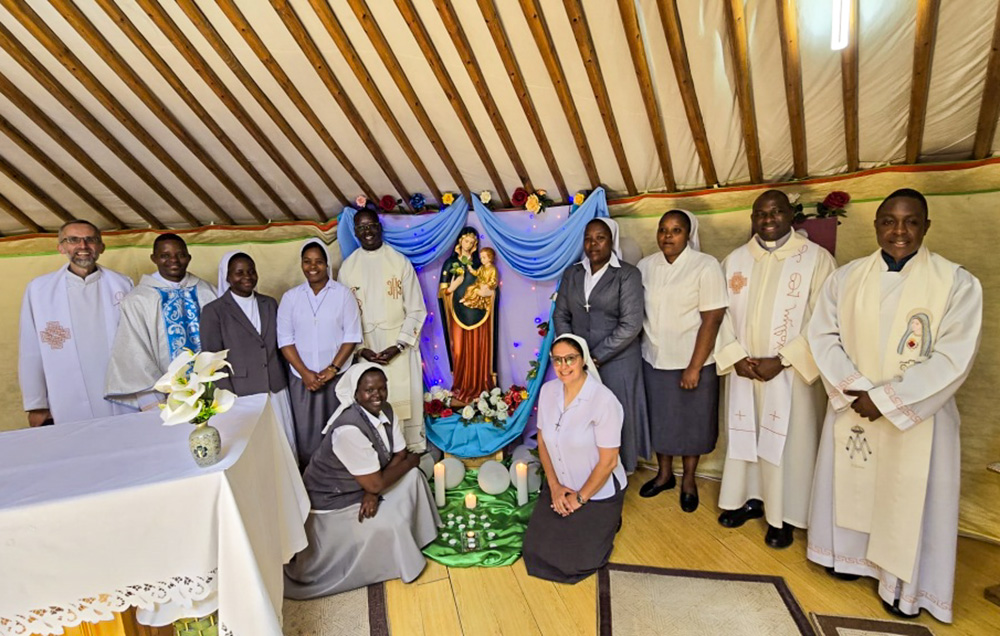
Consolata Missionary Sisters and Fathers celebrate the Consolata feast in Arvaikheer, 2024. (Courtesy of Francesca Allasia)
And yet, even in the desert, the Lord does not make us lack the water of his word nor precious companions on the way. We are a small community gathering around the One we have followed so far. We are a community that discerns together and needs to be "inhabited." This is another very important aspect of smallness: trusting, asking, holding by the hand the One who accompanies us on the journey.
Today, we are six fathers and seven Consolata sisters from seven different countries. We have a presence in the capital, north of the large urban outskirts, in a neighbourhood that is quite difficult because of social problems and marginalization. There, we carry out different activities and social services in the library "the Rising Sun."
We also have a presence in Arvaikheer, 400 kilometers from the capital, where we accompany the small Christian community in our Mother of Mercy Parish. There, we also strive for integral humanization through an informal kindergarten housed in a gher (a typical Mongolian dwelling), an afterschool program, a cutting and sewing project for women, a public shower service for those who do not have water in their homes, English and music classes for young people, an Alcoholics Anonymous group, and an ever-open door for those who struggle to heat their gher or who lack money for schoolbooks or medicine for their children.
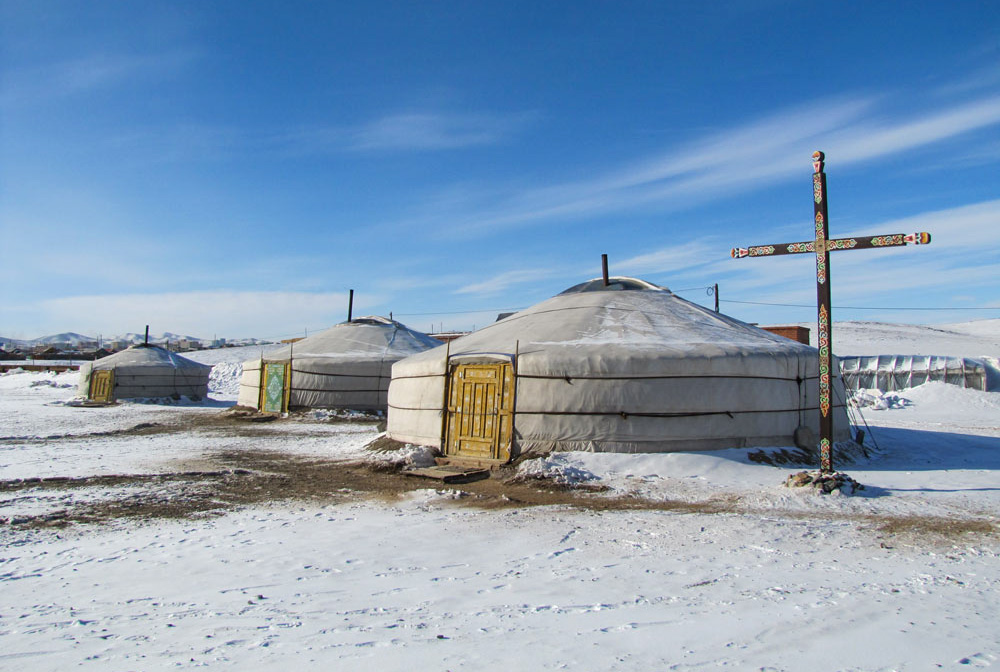
Mother of Mercy Parish and a gher used for activities in Arvaikheer, Mongolia (Courtesy of Francesca Allasia)
In 2014, we took the first steps in the field of interfaith dialogue in Kharkhorin — the ancient capital of the Mongolian empire, the cradle of local Buddhism and a symbolic place in the history of this country. Friendly and cooperative relations with local authorities are being forged here. The "House of Friendship" is a small meeting and exchange center, where we do not yet have a stable community, but which allows us to follow various initiatives from nearby Arvaikheer.
Through it all, we remain joyfully available to help the local church, participate in various committees, and walk in fellowship and fraternity together with the other congregations present.
From my experience I can say that a mission in Mongolia requires the patience of small steps, the strength to get back up after falls — even those on ice — and the generosity of the sower who spares no seed for the soil in which he finds himself. This mission requires the ability to love twice as much and watch twice as much over one's own heart and, at the same time, gives so much to those who open themselves to it.




